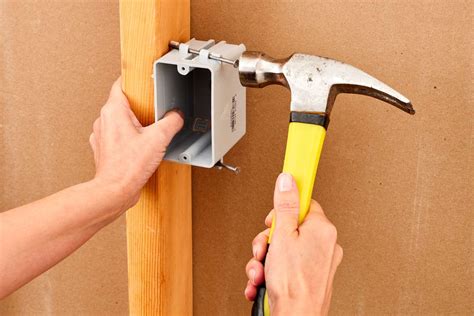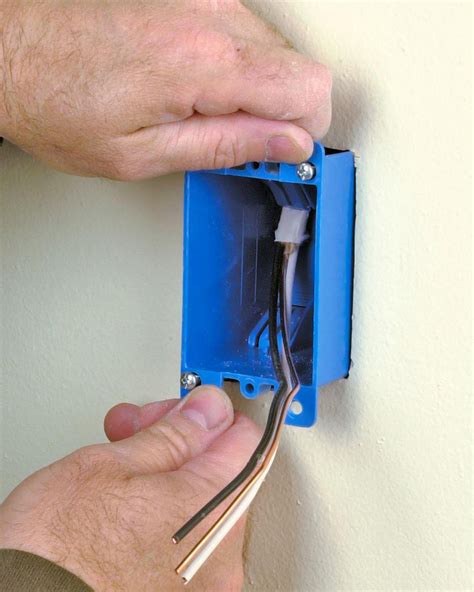electrical box 5 8 drywall Installing electrical boxes the depth of drywall while studs and joists are exposed is a handy and simple solution for homeowners. To do this . TRE designed sheet metal manifolds are completely custom "one off" pieces! Our manifolds have all machined radiuses, unlike most all other manufactures. Setup for one or two carbs, water or not.
0 · putting electrical box existing drywall
1 · installing wall mounted electrical boxes
2 · installing electrical box on drywall
3 · electrical outlet boxes for drywall
4 · electrical box for existing wall
5 · electrical box for existing drywall
6 · drywall mounted electrical box wings
7 · drywall mounted electrical box
Use an arc welder to weld galvanized steel. A standard arc welder is undoubtedly the best way to weld galvanized steel. Arc welding is a versatile method that uses alternating currents to create a high-heat arc that melts your flux. If .
putting electrical box existing drywall
steel triangle tool box
installing wall mounted electrical boxes
We are now switching to 5/8" interior drywall throughout. What is best practice, to simply line up with the box alignment tabs or should I extend the box out another 1/8" to the full . Installing electrical boxes the depth of drywall while studs and joists are exposed is a handy and simple solution for homeowners. To do this . Most residential drywall is 1/2- or 3/8-inch thick, so keep a handful of drywall strips of this thickness on hand to facilitate electrical box installation. If you are using a different wall .
Follow these expert tips to install an electrical box into drywall or plaster without the need for wall studs or joists. Not all fixtures need to be attached to a wall stud or joist. . Installing an electrical box at the proper depth of drywall involves several steps, including determining the location of the box, marking the outline on the drywall, cutting out the opening, measuring and cutting the hole in the . Safely and effectively install an electrical box in drywall by following step-by-step guidelines, ensuring proper placement, secure installation, and thorough testing for a successful DIY electrical project.

Cut-in electrical boxes secure into the drywall or plaster using wing screws or Madison straps, depending on the type of box you have. The wings press against the drywall and hold the box firmly in place. Likewise, . If the 5/8" drywall is installed correctly, your boxes will be 1/4" recessed. 98% of drywallers install the drywall incorrectly in which case expect your boxes to be recessed 5/8". Expect to use a lot of box extenders.
steel trunk box online india
We are now switching to 5/8" interior drywall throughout. What is best practice, to simply line up with the box alignment tabs or should I extend the box out another 1/8" to the full 5/8" depth? Installing electrical boxes the depth of drywall while studs and joists are exposed is a handy and simple solution for homeowners. To do this on your own, buy switch and receptacle boxes that meet local codes and are large enough for the wires they hold. Most residential drywall is 1/2- or 3/8-inch thick, so keep a handful of drywall strips of this thickness on hand to facilitate electrical box installation. If you are using a different wall thickness (such as 5/8-inch thick, required for some firewalls) make sure the reference strips match that thickness. Follow these expert tips to install an electrical box into drywall or plaster without the need for wall studs or joists. Not all fixtures need to be attached to a wall stud or joist. Lightweight fixtures can hold up on plaster or drywall if you have a remodel electrical box.

Installing an electrical box at the proper depth of drywall involves several steps, including determining the location of the box, marking the outline on the drywall, cutting out the opening, measuring and cutting the hole in the framing, inserting and securing the box, connecting the electrical wiring, and finally, installing the wall plate . Safely and effectively install an electrical box in drywall by following step-by-step guidelines, ensuring proper placement, secure installation, and thorough testing for a successful DIY electrical project. Cut-in electrical boxes secure into the drywall or plaster using wing screws or Madison straps, depending on the type of box you have. The wings press against the drywall and hold the box firmly in place. Likewise, Madison straps secure the box by grabbing on behind the drywall to support the box.
I am installing a 2 gang electrical box in my basement through 5/8" drywall. The back side of the wall is in an unfinished part of the basement, so I have access to attach the box to the stud.
My issue is that I need to install new work boxes so that they extend 1 1/4" beyond the stud. This way, when my second layer of 5/8" drywall goes up, it will be flush. I don't have enough depth with the boxes I am using to go out 1 1/4", so I am wondering if I can extend it 1 1/8" instead.
If the 5/8" drywall is installed correctly, your boxes will be 1/4" recessed. 98% of drywallers install the drywall incorrectly in which case expect your boxes to be recessed 5/8". Expect to use a lot of box extenders.
We are now switching to 5/8" interior drywall throughout. What is best practice, to simply line up with the box alignment tabs or should I extend the box out another 1/8" to the full 5/8" depth?
Installing electrical boxes the depth of drywall while studs and joists are exposed is a handy and simple solution for homeowners. To do this on your own, buy switch and receptacle boxes that meet local codes and are large enough for the wires they hold. Most residential drywall is 1/2- or 3/8-inch thick, so keep a handful of drywall strips of this thickness on hand to facilitate electrical box installation. If you are using a different wall thickness (such as 5/8-inch thick, required for some firewalls) make sure the reference strips match that thickness. Follow these expert tips to install an electrical box into drywall or plaster without the need for wall studs or joists. Not all fixtures need to be attached to a wall stud or joist. Lightweight fixtures can hold up on plaster or drywall if you have a remodel electrical box. Installing an electrical box at the proper depth of drywall involves several steps, including determining the location of the box, marking the outline on the drywall, cutting out the opening, measuring and cutting the hole in the framing, inserting and securing the box, connecting the electrical wiring, and finally, installing the wall plate .
Safely and effectively install an electrical box in drywall by following step-by-step guidelines, ensuring proper placement, secure installation, and thorough testing for a successful DIY electrical project.
Cut-in electrical boxes secure into the drywall or plaster using wing screws or Madison straps, depending on the type of box you have. The wings press against the drywall and hold the box firmly in place. Likewise, Madison straps secure the box by grabbing on behind the drywall to support the box. I am installing a 2 gang electrical box in my basement through 5/8" drywall. The back side of the wall is in an unfinished part of the basement, so I have access to attach the box to the stud.

How Do You Use a Stick Welder to Weld Thin Metal? The other name for the stick welding procedure is SMAW (Shielded Metal Arc Welding). This welding technique is older as compared to other types. However, it’s an easy procedure that guarantees you potent welds. Image Credit: vespaburoks, Pixabay
electrical box 5 8 drywall|drywall mounted electrical box wings